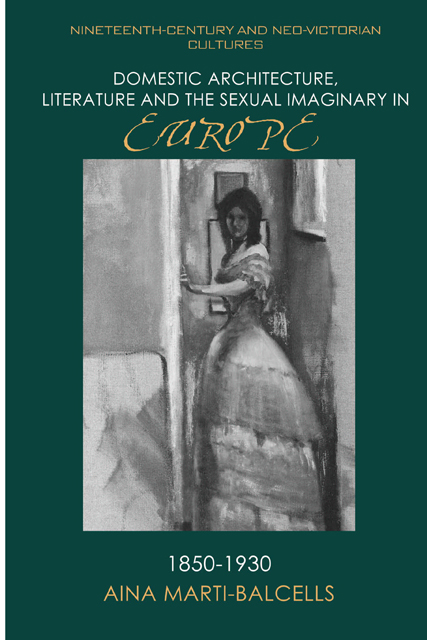Book contents
- Frontmatter
- Contents
- Series Preface
- Dedication
- Introduction
- 1 Adultery and the Subversion of Architectural Prescriptiveness in Madame Bovary and The Return of the Native
- 2 Sexual Accessibility and Exhibitionism: Glass in La Curée
- 3 Glass Dwellings and the Dissolution of Adultery in Fontane’s L’Adultera
- 4 Domestic and Sexual Circulation in Huysmans’ En ménage
- 5 Vienna: Towards a New Domestic Imaginary
- Bibliography
- Index
4 - Domestic and Sexual Circulation in Huysmans’ En ménage
Published online by Cambridge University Press: 02 June 2023
- Frontmatter
- Contents
- Series Preface
- Dedication
- Introduction
- 1 Adultery and the Subversion of Architectural Prescriptiveness in Madame Bovary and The Return of the Native
- 2 Sexual Accessibility and Exhibitionism: Glass in La Curée
- 3 Glass Dwellings and the Dissolution of Adultery in Fontane’s L’Adultera
- 4 Domestic and Sexual Circulation in Huysmans’ En ménage
- 5 Vienna: Towards a New Domestic Imaginary
- Bibliography
- Index
Summary
Huysmans’ En ménage (1881) tells the story of André, a middle-class married man who lives in an apartment in Paris with his wife Berthe. After finding Berthe with her lover, André separates from his wife, a situation that leads him to a constant change of home and sexual partners. This sense of permanent motion breaks with the static definitions of home articulated by the domestic ideal. In this context, En ménage represents a dissolution of normative sexual practices that finds a correlation with a constant change of homes. Sexuality and domesticity are permeated with mobility as every change of partner is signposted by a change of domestic space. This situation is ambiguously experienced by André, whose life becomes defined by a lack of stability and a constant need to find a proper place to live, and a woman. However, he does not altogether reject his new freedom either. André experiences the contradiction of longing for a more traditional way of living constituted by a household, a wife and a servant, while at the same time he conforms to an emerging cultural view based on the deconstruction of the domestic ideal. We will see how this paradox permeates Huysmans’ text with a certain cynicism regarding changes in domestic culture. From a male perspective, En ménage represents the pleasures and the challenges of a lifestyle where the household becomes de-regularised by the introduction of divorce and more liberal relationships. We have seen how Maxime Saccard willingly changes places and women without any intention of settling down until his official engagement with Louise. However, André is trapped in the configuration of a new way of living and organisation of family life he himself has not fully chosen but has encountered: while for Maxime this dynamic approach to domestic space and sexuality is an alternative to a settled bourgeois life, André belongs to a period when this dynamism starts constituting the norm, and becoming, eventually, more generalised. This seeming lack of choice makes it necessary for André to introduce an element of cultural negotiation.
Important for the approach this chapter takes to analysing En ménage is the intertextual relationship between the novel and Huysmans’ essays on seventeenth-century Dutch art. Huysmans wrote several essays on seventeenth-century Dutch painting in which he praises the technique and the topics of artists such as Frans Hals, Pierre de Hooch and Rembrandt, among others.
- Type
- Chapter
- Information
- Publisher: Edinburgh University PressPrint publication year: 2022



